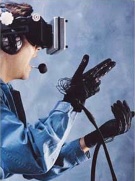|
 The Internet absorbs what is created in the reality. Last book about Harry Potter has appeared on the Net in four hours after the beginning of its sale. The group of fans has bought the book, has broken it into the parts and there and then got down to work, each one under the recognition of the relative part of the pages. The Internet absorbs what is created in the reality. Last book about Harry Potter has appeared on the Net in four hours after the beginning of its sale. The group of fans has bought the book, has broken it into the parts and there and then got down to work, each one under the recognition of the relative part of the pages.
Since the research boom of 90s on the technologies of virtual reality, people without cease continue creating a virtual world, creating simulacra of our reality.
Nevertheless, virtual reality at the present time is not that Lawnmower Man virtual reality where human mind is transferred right into virtual world, but a helmet with high-quality picture, pair of gloves as a kind of tangible interface, hi-fi surround sound, 3-D worlds. |
|
|
|
 |
 There.com online virtual 3-D world There.com online virtual 3-D world |
Socialising plays a great role for every person both in real world and virtual one. The global network creates conditions for formation of virtual communities, groups of interests in the virtual world.
Of course we cannot but mention the good old FIDO network as a «living history». It was hard to get in, and hard to get out of Fido Net. Quite private community known for its feeling of comradeship propagandises trust between its members, as FIDO itself stands for «I trust» in Latin meaning. Nowadays FIDO is remembered associated as one with Bulleting Board and Usenet systems used for communication.
There.com is the most vivid example of the modern online environment for the existence of the virtual community with their own habits, rules and taboos. «There» is an online 3-D world offering an excellent place not only for virtual communication of people with each other, but for creating virtual version of themselves, leading your own virtual life. So to say «There» is an online implementation of very popular «Sims» PC-game. Users have really wide opportunities: starting from organising a party to have a nice walk the dog, having a ride on a buggy to building their own house. What is more important, they make friends.
 Other vivid example of interaction of reality with the Internet — marriage agencies. They prosper; the number of the international marriages has considerably increased. Purchase of brides is no longer the category, like purchase of air tickets from the Internet. Other vivid example of interaction of reality with the Internet — marriage agencies. They prosper; the number of the international marriages has considerably increased. Purchase of brides is no longer the category, like purchase of air tickets from the Internet.
One more phenomenon of the same class is acquaintance and friendship in correspondence with the possible subsequent arrival on a visit. Certainly, there is a great chance to meet the person you have ever dreamed about in the Internet and to start cyber-love relationships. However, one of the main advantages of this kind of relationships is that you cannot judge people on physical appearance. As the Sara Carlstead said, «You are able to learn about the person from the inside-out, instead of the outside-in».
Evident minus in this fairly often dubious love over the Net is that the couples can tell themselves any lie and the truth will be kept somewhere hard to get from.
 |
 Screenshot from flight simulator PC-game Screenshot from flight simulator PC-game |
However, there is another «side of a coin» of virtual environment as cybercrime. It is worth mentioning about the events of September 11, 2001, in USA, when terrorists used virtual reality environment for planning and training for their dreadful attack actions.
For one's turn, computer virus epidemics, rapidly spreading over the Net, infect millions of the computer systems. In that way virus writers jeopardise to bankrupt many prosperous companies all over the world, causing damage to the world economy. To control the cybercrime the division of Internet-police was organised several years ago, which keeps order on the Net.
By no means, these are not silly people who write viruses, but extremely computer literate enthusiasts, mostly people who previously worked in the sphere of computer security. Their actions, in our opinion, are most likely done for self-affirmation purposes, as well as for trying to prove that the Internet is full of vulnerabilities, and that the security level in cyberspace is not that high as governmental security services claim. However, it could be much more useful, if these people directed their skills in the right course, helping to solve global problems rather than aggravating them.
| |
|
PC-gaming nowadays turned from entertaining pastime into professional type of sports — cybersports. The biggest games developing companies regularly organise large-scale tournaments. Teams of cybergamers, mainly aged 15-25, from all over the world come together to compete for the title of the fastest, dexterous and smartest gamers of the virtual world. Prizes for winning these prestigious championships average 50-100 thousand dollars.
Scientist say that playing games strengthens person's reaction skills, makes one more attentive. However, at the same time they cause eyesight injuries. What is more important, it should be remembered that serious gaming may cause a serious mental disorder, aggression, gaming-dependence. Every «confirmed gamer» feels drawn to winning and can't tear himself away from game before completing it; nevertheless, as soon as game is finished, he starts another one.
Consequences of such kind of gaming-dependence in real life, offline, are quite horrible:
< See the video > (opens in a new window) |
| |
| |
|
« netizens | virtuality | outro »
|
| |
|
|

 The Internet absorbs what is created in the reality. Last book about Harry Potter has appeared on the Net in four hours after the beginning of its sale. The group of fans has bought the book, has broken it into the parts and there and then got down to work, each one under the recognition of the relative part of the pages.
The Internet absorbs what is created in the reality. Last book about Harry Potter has appeared on the Net in four hours after the beginning of its sale. The group of fans has bought the book, has broken it into the parts and there and then got down to work, each one under the recognition of the relative part of the pages.
 Other vivid example of interaction of reality with the Internet — marriage agencies. They prosper; the number of the international marriages has considerably increased. Purchase of brides is no longer the category, like purchase of air tickets from the Internet.
Other vivid example of interaction of reality with the Internet — marriage agencies. They prosper; the number of the international marriages has considerably increased. Purchase of brides is no longer the category, like purchase of air tickets from the Internet. 
